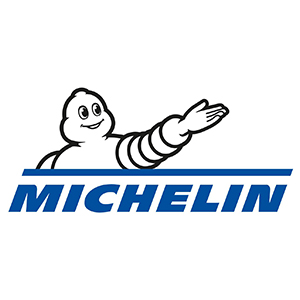
- Okeya Kyujiro earns a MICHELIN Star, bringing city’s total to nine
- Five more Bib Gourmand, plus four special awards, also revealed
- 77 restaurants constitute 2023 selection – up from 60 in 2022
- 2023 edition also includes 21 different types of cuisine
VANCOUVER, British Columbia, Oct. 5, 2023 — A new MICHELIN-Starred restaurant, five new Bib Gourmand and 12 new Recommended restaurants crossed the stage Thursday night at the Fairmont Pacific Rim to highlight the announcement of the 2023 MICHELIN Guide Vancouver.
The MICHELIN Guide also revealed four special awards at the ceremony. Overall, the MICHELIN Guide inspectors awarded Stars to nine restaurants – eight of which earned Stars in 2022. The full 2023 selection comprises 77 restaurants and 21 types of cuisine.
“The famously anonymous MICHELIN Guide inspectors once again were impressed with the culinary community here,” said Gwendal Poullennec, the International Director of the MICHELIN Guides. “This sort of steady growth is what we often see in second-year selections, and it is definitely a harbinger of great things to come. We are very proud of the passionate chefs and restaurant teams here in Vancouver, and they make their city very proud.”
Okeya Kyujiro, helmed by Chef Takuya Matsuda, earned one MICHELIN Star for the first time. Here are the inspector notes (inspectors’ comments in full on the MICHELIN Guide website and mobile app):
Okeya Kyujiro (Japanese cuisine)
Hosts dressed in stunning traditional clothing guide you to a dark room, lit only by the faintest glow from votive candles. A black curtain is raised ceremoniously only when the clock strikes the precise minute of your seating. These are the first clues that this is far from your typical omakase. From the premium, hyper-seasonal fish to the demonstration of sasagiri (traditional Japanese bamboo leaf carving), it is a memorable show from start to finish. Highlights include chawanmushi with cherry blossom, shatteringly crispy tempura sandbar fish, spicy firefly squid on a bamboo skewer and a presentation of two uni petals from different Japanese waters served with seaweed jam.
Bib Gourmand
The MICHELIN Guide inspectors added five restaurants to the Bib Gourmand list, which recognizes eateries for great food at a great value: Farmer’s Apprentice, Karma Indian Bistro, Motonobu Udon, Seaport City Seafood and Sushi Hil.
Special Awards
In addition to the Bib Gourmands and Stars, the Guide announced four special awards:

The MICHELIN Guide Ceremony is presented with the support of Capital One. Transportation provided by Mercedes-Benz.
Hotel
The restaurants join the MICHELIN Guide selection of hotels, which features the most unique and exciting places to stay in Vancouver and throughout the world.
Each hotel in the selection has been chosen by MICHELIN Guide experts for its extraordinary style, service, and personality — with options for all budgets — and each can be booked directly through the MICHELIN Guide website and app. The selection for Vancouver features the city’s most spectacular hotels, including design-forward luxury boutiques like the Douglas, standouts from our “Plus” collection like the Loden and the Opus, old-world elegance like the Wedgewood, and dependable luxury stalwarts like the Fairmont Pacific Rim.
The MICHELIN Guide is a benchmark in gastronomy. Now it’s setting a new standard for hotels. Visit the MICHELIN Guide website, or download the free app for iOS and Android, to discover every restaurant in the selection and book an unforgettable hotel.

The 2023 MICHELIN Guide Vancouver selection:
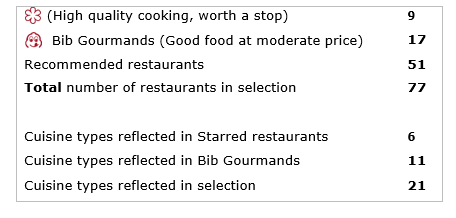
Vancouver’s 2023 MICHELIN-Starred restaurants
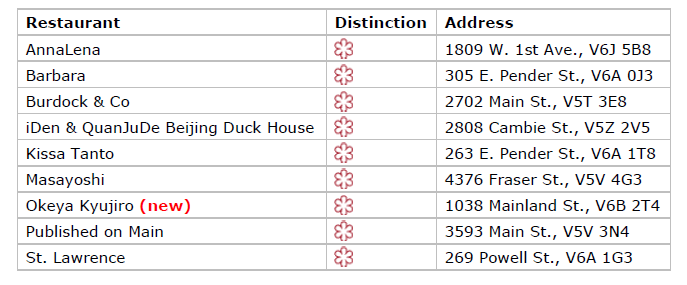 Vancouver’s 2023 Bib Gourmand restaurants
Vancouver’s 2023 Bib Gourmand restaurants
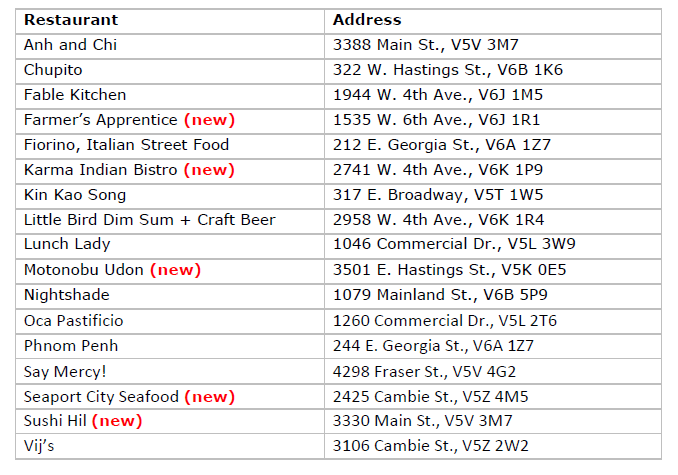 Vancouver’s 2023 Recommended restaurants
Vancouver’s 2023 Recommended restaurants
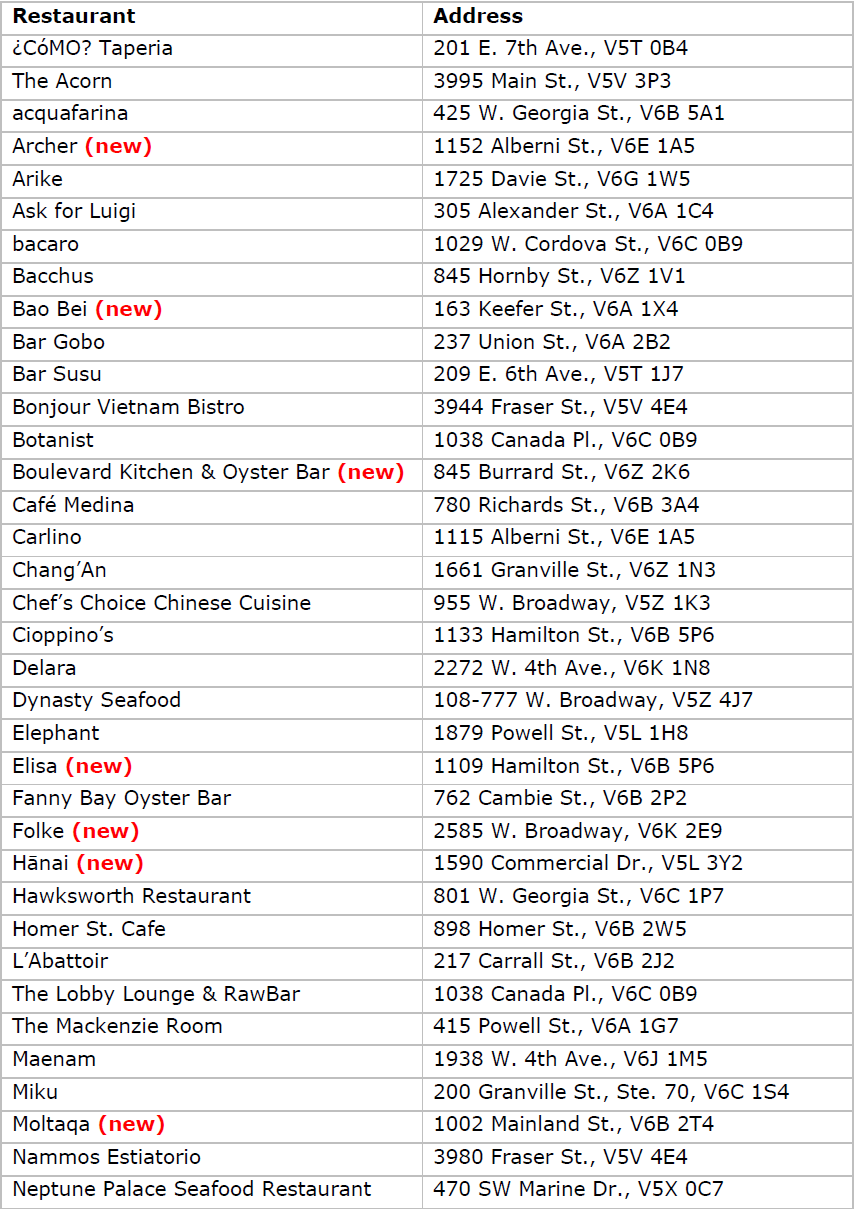
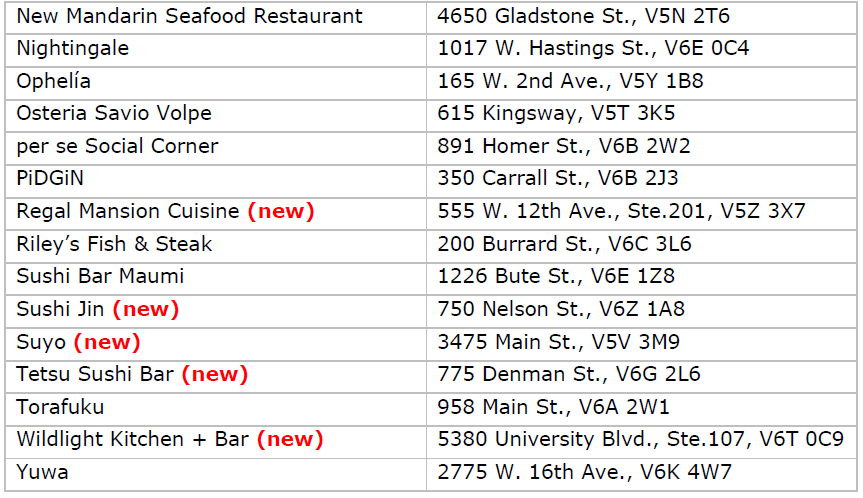
About Michelin North America, Inc.
Michelin, the leading mobility company, is working with tires, around tires and beyond tires to enable Motion for Life. Dedicated to enhancing its clients’ mobility and sustainability, Michelin designs and distributes the most suitable tires, services and solutions for its customers’ needs. Michelin provides digital services, maps and guides to help enrich travel and make them unique experiences. Bringing its expertise to new markets, the company is investing in high-technology materials, 3D printing and hydrogen, to serve a wide variety of industries — from aerospace to biotech. Headquartered in Greenville, South Carolina, Michelin North America has approximately 23,000 employees and operates 34 production facilities in the United States and Canada. (michelinman.com)
About Capital One
At Capital One we’re on a mission for our customers – bringing them best-in-class products, rewards, service, and experiences. Capital One is a diversified bank that offers products and services to individuals, small businesses and commercial clients. We use technology, innovation, and interaction to provide consumers with products and services to meet their needs. Through Capital One Dining and Capital One Entertainment, we provide our rewards cardholders with access to unforgettable experiences in the areas they’re passionate about, including dining, music and sports. Learn more at capitalone.com/dining and capitalone.com/entertainment.
For more information, contact:
Andrew Festa
Michelin North America andrew.festa@michelin.com
Devon Gunn Capital One
devon.gunn@capitalone.com Phone: 571-308-4762
Contact Information
Name: Andrew Festa
Email: andrew.festa@michelin.com
Job Title: Press Officer
AI-Driven Partnership: Myndshft & Augmedix to Revolutionize Clinical Documentation & Prior Authorization

The Collaboration Aims to Significantly Boost Operational Efficiency, Enhancing Provider Experiences and Patient Outcomes
Mesa, AZ (October 5, 2023) — Healthcare tech leaders Myndshft, an automated prior authorization platform, and Augmedix (Nasdaq: AUGX), a healthcare technology company that delivers industry-leading, ambient medical documentation, announced today a plan for a strategic partnership to deeply integrate their platforms to create a combined offering for the healthcare market. Together, Augmedix and Myndshft plan to offer harmonized automation solutions to address the spectrum of critical administrative burdens that face healthcare providers, ensuring a superior healthcare experience for both practitioners and patients.
“Our alliance with Augmedix is a milestone in healthcare efficiency. We expect our merged technologies to streamline operations and ensure precision and care at every stage, from documentation of patient interactions, to prior authorization submissions and status monitoring. We aim to set a new benchmark in healthcare delivery standards,” remarks Ron Wince, CEO of Myndshft.
Countering Burnout with Advanced Tech
The American Medical Association has underscored the link between administrative pressures and its impact on clinician burnout and productivity. Augmedix’s industry-leading technology alleviates this burden by capturing patient-provider conversational data in real time and converting the data into medical notes. Myndshft provides further enhancements and ROI benefits, with a rapid provider-payer data exchange, automation of benefits verification, and streamlining of authorizations. Augmedix and Myndshft plan to collaborate to offer a combined implementation, support model, data model, and EHR integration infrastructure that enables providers to prioritize patient care over paperwork.
The key benefits of the Myndshft and Augmedix partnership will include:
- Boosted Productivity: AI and automation can reduce prior authorization transaction times and EHR administrative entry times by 70% or more.1
- Enhanced Accuracy: Quality medical notes and error-checked authorizations mitigate delays or denials.
- Improved Reimbursements: Accurate clinical records and smoother authorizations reduce friction in providers’ revenue cycles.
- Optimized Patient Care: Reduced administrative tasks let clinicians emphasize patient interactions, enhancing experiences and outcomes.
“Together with Myndshft, we are poised to transform healthcare documentation and delivery, from the exam room to the back office,” shared Ian Shakil, Founder, Director, and Chief Strategy Officer of Augmedix. “Augmedix is committed to not only directly tackling the critical administrative burdens of note-taking, but also to enabling an open ecosystem of partners and integrations to directly address other mounting administrative challenges that face providers beyond note creation.”
This partnership will allow Myndshft and Augmedix to set new standards, ensuring that clinicians can do what they do best—care for their patients. The parties have agreed in principle on a strategic partnership and are working towards the completion of a definitive agreement regarding the partnership.
1 Source: McKinsey
About Myndshft
Myndshft began with a mission to enable value-based care by empowering healthcare providers and payers to drive down costs and increase revenue while achieving optimal patient care.
Today, Myndshft is the only prior authorization platform in the market that consolidates drug management across both medical and pharmacy benefit types. Myndshft reduces manual work, eliminates duplication of effort, and shortens preauthorization cycle times so providers and payers can focus on patients, not paperwork.
For more information, visit www.myndshft.com.
About Augmedix
Augmedix (Nasdaq: AUGX) delivers industry-leading, ambient medical documentation and data solutions to healthcare systems, physician practices, hospitals, and telemedicine practitioners.
Augmedix is on a mission to help clinicians and patients form a human connection by seamlessly integrating our technology at the point of care. Augmedix’s proprietary platform digitizes the natural clinician-patient conversations, which are converted into comprehensive medical notes and structured data in real time. The company’s platform uses automatic speech recognition and natural language processing, including large language models, to generate accurate and timely medical notes that are transferred into the EHR.
Augmedix’s products relieve clinicians of administrative burden, in turn, reducing burnout, increasing clinician efficiency and improving patient access. Through Augmedix’s proprietary platform and bi-directional communication channel, Augmedix is ideally suited to serve as the vehicle for change at the point of care.
Augmedix is headquartered in San Francisco, CA, with offices around the world. To learn more, visit www.augmedix.com.
Myndshft Media Contact
Name: Jennifer Royle-Jones
Email: jen@myndshft.com
Phone: (480) 718-2163 ext. 719
Augmedix Media Contact
Name: Kaila Grafeman
Email: pr@augmedix.com
Phone: (888) 669-4885
Mint Mobile Appeals National Advertising Division Recommendation to Discontinue or Modify Claim that its Unlimited Plan is “Now Just $15/Mo.”
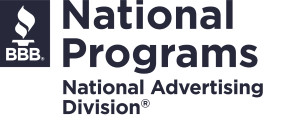
New York, NY – October 4, 2023 – In a Fast-Track SWIFT challenge brought by AT&T Services, Inc., the National Advertising Division (NAD) of BBB National Programs recommended that Mint Mobile, LLC discontinue or modify the claim that its Unlimited Plan is “now just $15/mo.”
Mint Mobile offers prepaid phone plans, which, unlike plans offered by AT&T and other major wireless carriers, require customers to pay upfront before receiving service. Mint Mobile’s $15/mo price for its Unlimited plan is a promotional rate that is only in effect for three months. After three months of service, the monthly rate increases with the exact amount of the increase dependent on which plan the consumer selects.
Fast-Track SWIFT is an expedited process designed for single-issue advertising cases brought to NAD. At issue for NAD was whether the nature of Mint Mobile’s promotional offer was adequately disclosed.
In banner ads, on social media, and in a television commercial, Mint Mobile advertises that the price of its Unlimited Plan is “now just $15/mo.” However, NAD found that the challenged advertising does not adequately disclose that the $15 monthly service is a promotional offer for only three months of service.
Accordingly, NAD recommended that Mint Mobile discontinue the claim that its Unlimited Plan is “now just $15/mo” or clearly and conspicuously disclose that the offer is a promotional offer for three months of service as part of the main claim or in similar size text and font in close proximity to the main claim.
In its advertiser statement, Mint Mobile stated that it will appeal NAD’s decision because it “respectfully disagrees with NAD’s determination that the contours of the promotion were inadequately disclosed and that consumers reasonably interpret the phrase, ‘now just $15/mo’ to mean that ‘the rate is one in perpetuity, or of longer duration similar to introductory pricing offered by other wireless carriers’” because Mint Mobile only offers “wireless service plans in three-, six-, and twelve-month increments.”
Appeals of NAD decisions are made to the BBB National Programs’ National Advertising Review Board (NARB), the appellate-level truth-in-advertising body of BBB National Programs.
All BBB National Programs case decision summaries can be found in the case decision library. For the full text of NAD, NARB, and CARU decisions, subscribe to the online archive. This press release shall not be used for advertising or promotional purposes.
About BBB National Programs: BBB National Programs, a non-profit organization, is the home of U.S. independent industry self-regulation, currently operating more than a dozen globally recognized programs that have been helping enhance consumer trust in business for more than 50 years. These programs provide third-party accountability and dispute resolution services that address existing and emerging industry issues, create a fairer playing field for businesses, and a better experience for consumers. BBB National Programs continues to evolve its work and grow its impact by providing business guidance and fostering best practices in arenas such as advertising, child-and-teen-directed marketing, data privacy, dispute resolution, automobile warranty, technology, and emerging areas. To learn more, visit bbbprograms.org.
About the National Advertising Division: The National Advertising Division (NAD) of BBB National Programs provides independent self-regulation and dispute resolution services, guiding the truthfulness of advertising across the U.S. NAD reviews national advertising in all media and its decisions set consistent standards for advertising truth and accuracy, delivering meaningful protection to consumers and leveling the playing field for business.
Contact:
Jennie Rosenberg
Media Relations
BBB National Programs
press@bbbnp.org
STATE REPRESENTATIVES HARRIS AND SCHWEYER KICK-OFF PENNSYLVANIA EDUCATION TOUR
Pennsylvania Education Tour Kicks-Off in Pittsburgh October 5
HARRISBURG, PA., (October 3, 2023)– House Appropriations Committee Chairman Jordan Harris and House Education Chairman Pete Schweyer will kick-off the Pennsylvania Education Tour in Pittsburgh on Thursday, October 5, 2023.
As part of a joint effort between the House Appropriations and Education Committees, the statewide tour will examine education funding broadly in the wake of the Commonwealth Court’s ruling declaring Pennsylvania’s public education funding system unconstitutional and to assess efforts to address educational inequality in Pennsylvania, including existing and additional options to education.
“Now is not the time to be adversarial on the issue of education; it is the time to be visionary, it is the time to be inspirational and aspirational about what we could do as a Commonwealth with regards to our children,” said Representative Jordan Harris, Majority Chairman of the House Appropriations Committee. “It is incumbent upon us to make the necessary changes to ensure that every child in Pennsylvania, regardless of zip code or economic status, has the opportunity to propel themselves, their family, and their community, upward through the power of education.”
The Pennsylvania Education Funding Tour will address the shared concerns beyond educational funding related to staffing shortage issues, school safety, infrastructure investments, and access to high-quality and equitable
schools. Tour stops throughout the state will invite parents, residents, community leaders, and education experts to come together, provide testimony, and collectively take on the responsibility of supporting and realizing equitable and safe schools for all Pennsylvania students.
“The challenge is more than just a financial one,” said Representative Pete Schweyer, Majority Chairman of the House Education Committee. “We must re-examine and reimagine the education system in Pennsylvania- not just how many dollars we spend on education but also how those dollars are being spent. That is why we, the Education and House Appropriations Committee members, will be embarking on this statewide tour throughout the Commonwealth to learn from experts on issues including funding challenges, school facilities, school-based mental health, and academic curriculum.”
The full list of Pennsylvania Education Tour dates and locations are as follows:
- October 5- Allegheny Traditional Elementary Academy, 810 Arch Street, Pittsburgh, PA 15212
1 p.m. – 4:30 p.m. Public Hearing & 6:30 p.m. – 7:30 p.m. Public Comment
- October 6- Community College of Beaver County, Athletic & Events Center, 1 Campus Dr., Monaca, PA 15061
10 a.m. – 1 p.m. Public Hearing
- October 24- School District of Philadelphia, Administrative Building, Suite 301 440 N. Broad, Philadelphia, PA 19130
1 p.m. – 4 p.m. Public Hearing & 6 p.m. – 7:30 p.m. Public Comment
- October 25- Community College of Philadelphia Library & Learning Commons, Exhibit Hall 1700 Spring Garden Street, Philadelphia, PA 19130
10 a.m. – 1 p.m. Public Hearing
- November 2- Kings College, McGowan School of Business, Burke Auditorium 131 N. River St., Wilkes-Barre, PA 18711
2 p.m. – 5 p.m. Public Hearing
- November 16 – Norristown, PA
1 p.m. – 4 p.m. Public Hearing
- November 17- Penn Wood High School Auditorium, 100 Green Ave., Lansdowne, PA 19050
10 a.m. – 1 p.m. Public Hearing
For more on the Education Funding Tour, visit https://www.houseappropriations.com/EducationTour and follow the tour on YouTube, Facebook, and X (formerly known as Twitter).
Contact Information
Name: Christina Fonseca
Email: cfonseca@hacd.net
Job Title: Director of Communications
The post-pandemic legal bubble is under pressure – and it’s showing. Latest LexisNexis research predicts slowing growth for 2024 legal market.

Market challenges might finally be hitting the seemingly resilient legal sector. The latest GLP Index predicts growth will drop to only +2% in 2024 from 2023’s +6% growth.
LONDON, 3 October 2023 – Today, LexisNexis Legal & Professional®, a leading global provider of legal information and analytics, has released the latest “Gross Legal Product (GLP) Index”. This report predicts that the legal sector will grow by +2% in 2024 – suggesting that its growth trajectory is slowing.
Despite exceptionally challenging market conditions over the past three years, the Index revealed that legal demand grew by +22% in 2021, +3% in 2022 and is expected to grow by +6% in 2023.
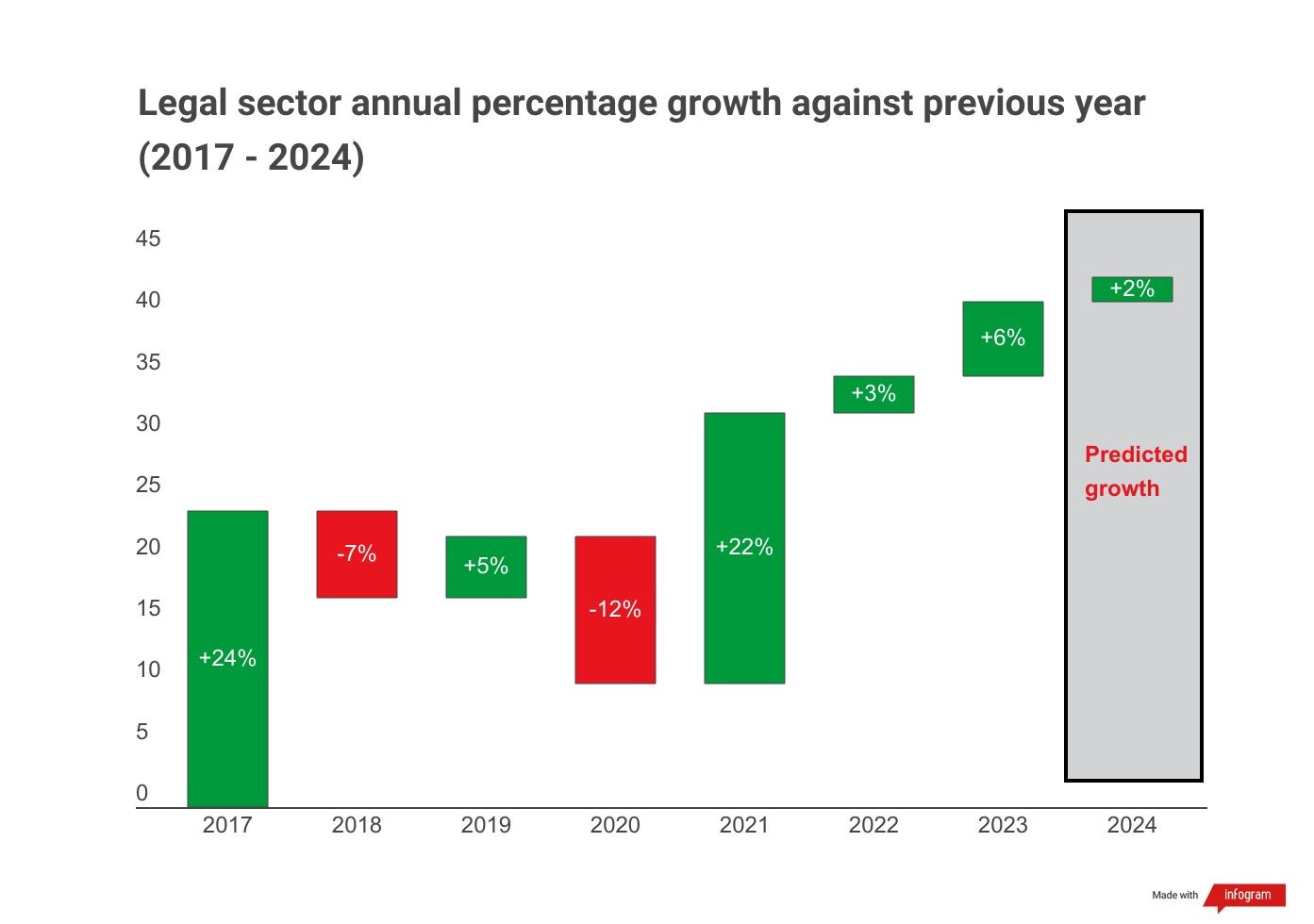
However, the latest edition of the GLP Index, which pulls historic data from hundreds of sources to predict future demand across the legal market, reveals market challenges may finally be catching up with the legal sector. These findings align with other recent events in the legal market, such as several high-profile law firms considering redundancies.
When looking at specific areas of the law, the Index predicts strong growth across property (+7%), immigration (+7%) and restructuring and insolvency law (+6%). Both property and immigration law rebounded in the previous GLP Index after several years of decline. The former has benefited from a record number of newly-completed dwellings (a 9% increase), while the latter has seen the total number of work visas issued almost double, with student visas, settlement applications and citizenship applications also on the rise.
Demand for competition (-5%) and risk and compliance law (+1%), on the other hand, will flatten next year after experiencing steady growth throughout 2022 and 2023. Practice areas that are challenged include criminal law, which is predicted to see negative growth (-3%) for the third year running, and employment law (-2%).
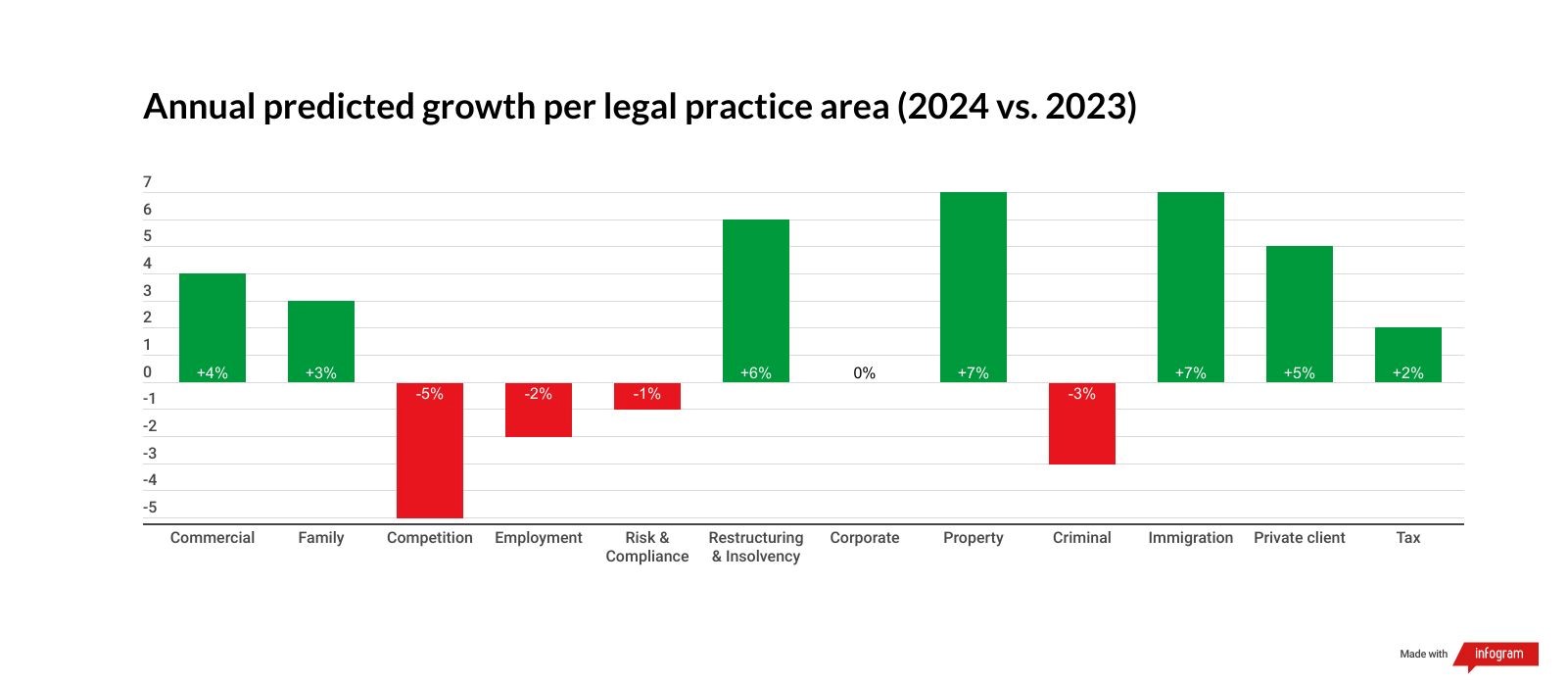
The report’s editor, Dylan Brown, says:
“Considering the geopolitical and macroeconomic headwinds that have battered the professional services industry for the last 18 months, subdued growth is an overwhelmingly positive message to be sharing. Recent growth speaks more to the legal sector’s resilience, ability to innovate when needed, and drive to power forward than it does to its impregnability.”
“Margins are becoming tighter” Brown continues. “So, there is also a very real risk of lawyer burn out as targets increase and the partner track presents greater risk. Firms need to continue investing in infrastructures that support their people rather than work against them.”
Notes for editors
- Read the report here: https://www.lexisnexis.co.uk/research-and-reports/glp-index-2024.html
- The attached graphs show Year on Year percentage growth across the legal sector and an overview of performance across all practice areas included in the report. They have been extracted from the report.
- Spokespeople or quotes can be provided on request.
About LexisNexis Legal & Professional
LexisNexis Legal & Professional® provides legal, regulatory, and business information and analytics that help customers increase their productivity, improve decision-making, achieve better outcomes, and advance the rule of law around the world. As a digital pioneer, the company was the first to bring legal and business information online with its Lexis® and Nexis® services. LexisNexis Legal & Professional, which serves customers in more than 150 countries with 11,300 employees worldwide, is part of RELX, a global provider of information-based analytics and decision tools for professional and business customers.
Contact Information
Matthew Leopold
Head of Brand and PR
07788435569
Matthew.Leopold@lexisnexis.co.uk
2023 MICHELIN Guide Toronto increases in Star power
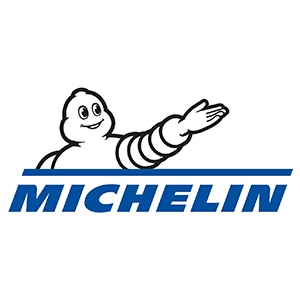
- Two restaurants earn a MICHELIN Star for the first time
- Toronto receives its first-ever MICHELIN Green Star
- 21 Bib Gourmand, plus four special awards, also unveiled
- 82 total restaurants, 28 cuisine types reflected in selection
TORONTO, Sept. 27, 2023 — Two restaurants, Kappo Sato and Restaurant 20 Victoria, joined the exclusive list of MICHELIN-Starred eateries in Canada, as the 2023 MICHELIN Guide Toronto was announced Wednesday night.
Overall, the anonymous MICHELIN Guide inspectors awarded Stars to 15 restaurants, with Sushi Masaki Saito remaining atop that list with two MICHELIN Stars. The 2023 selection comprises 82 restaurants and 28 types of cuisine. Chefs and restaurant teams were honored during a ceremony at HISTORY in Toronto.
Frilu, which retained its one MICHELIN Star, and White Lily Diner, which earned a 2023 Bib Gourmand, were awarded the city’s first MICHELIN Green Stars in recognition for their leadership in sustainable gastronomy.
“Since the inaugural selection in Toronto last year, we have seen and felt the momentum grow in this culinary community,” said Gwendal Poullennec, the International Director of the MICHELIN Guides. “The passion, encouragement and determination has been evident, and we see the fruit of that labor today. We are very pleased to welcome Kappo Sato and Restaurant 20 Victoria into the family of MICHELIN-Starred restaurants. The famously anonymous Guide inspectors were also inspired by the commitment to sustainable gastronomy at Frilu and White Lily Diner.”
Here are the new one-MICHELIN-Star restaurants, with inspector notes from each (inspectors’ comments in full on the MICHELIN Guide website and mobile app):
One MICHELIN Star
Kappo Sato (Japanese cuisine)
Unlike the quiet ceremony of a sushi omakase or the formal structure of a kaiseki, this freewheeling tasting is driven solely by Chef Takeshi Sato, who swims in familiar culinary waters on his own terms. The room is a constant blur of motion thanks to a young team that hurries about preparing multiple courses at once. Sato is their seasoned guide, as he moves with intention, ever masterful with a knife, and works with an impressive bounty of ingredients, most of which are flown in from Japan. Soulful dashi broths weave in and out of view alongside clever courses like tempura fried mackerel with shiso or seared toro nigiri with Japanese green onions.
Restaurant 20 Victoria (Contemporary cuisine)
On a quiet stretch of downtown Toronto, Chef Julie Hyde is making her talents known in this tiny-but-mighty restaurant that captured the city’s heart the day it opened. Top-notch local produce, pristine seafood and refined sauce work make for a delicious trifecta on a seasonal tasting menu that boasts originality in spades. Recent highlights included smoked beets with oyster cream as well as grilled fish with beurre blanc and eel crumble. The dimly lit dining room is elegantly easy-going, as Hyde and her small team work with laser-like focus from a kitchen that’s simultaneously always in use and always pristine.
MICHELIN Green Star
Frilu (Contemporary cuisine)
Owner-established Willowolf Farm uses no-till methods to grow fruits and vegetables for Frilu to use throughout the seasons. Chef John-Vincent Troiano hand-picks produce every morning to ensure a truly sustainable farm-to-table experience. A composting program uses all kitchen waste to enrichen the farm’s soil. Canadian ingredients, bought from local markets and farmers, are used throughout the year.
White Lily Diner (Creative cuisine)
Their organic, no-till farm and greenhouses supply the diner (and more than 15 other restaurants) with produce. They raise chickens to supply the diner with eggs. Only hand tools are used on the farm. Insect netting and greenhouses mitigate insects and disease. An orchard was recently planted and is being cultivated.
Bib Gourmand
The MICHELIN Guide inspectors added four restaurants to the Bib Gourmand list, which recognizes eateries for great food at a great value: BB’s, Sunnys Chinese, Tiflisi and White Lily Diner.
Special Awards
In addition to the Bib Gourmand and Stars, the Guide announced four special awards:

The MICHELIN Guide Ceremony is presented with the support of Capital One.
Hotels
The restaurants join the MICHELIN Guide selection of hotels, which features the most unique and exciting places to stay in Toronto and throughout the world. Each hotel has been chosen by MICHELIN Guide experts for its extraordinary style, service and personality — with options for all budgets — and each can be booked directly through the MICHELIN Guide website and app. The selection for Toronto features the city’s most spectacular hotels, including sustainability pioneers like 1 Hotel Toronto, standouts from the “Plus” collection like the Hazelton and the SoHo, cutting-edge boutiques like Ace Hotel and the Drake, and dependable luxury stalwarts like the Ritz-Carlton.
The MICHELIN Guide is a benchmark in gastronomy. Now it’s setting a new standard for hotels. Visit the MICHELIN Guide website, or download the free app for iOS and Android, to discover every restaurant in the selection and book an unforgettable hotel.

The 2023 MICHELIN Guide Toronto selection:
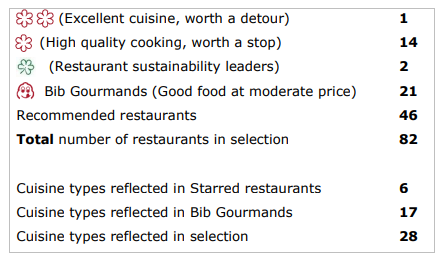
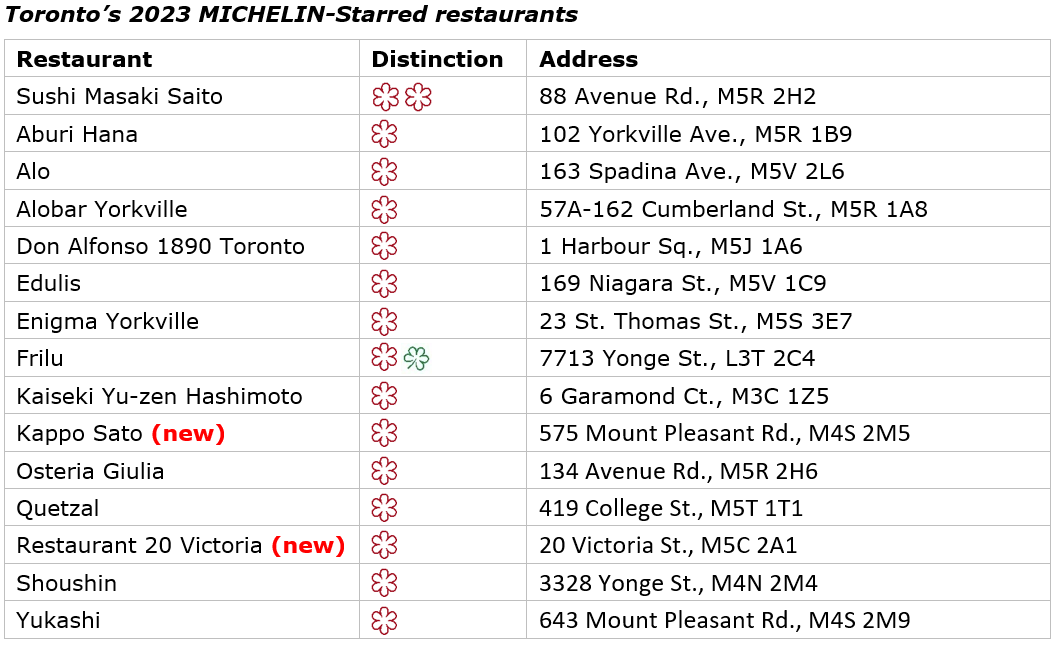

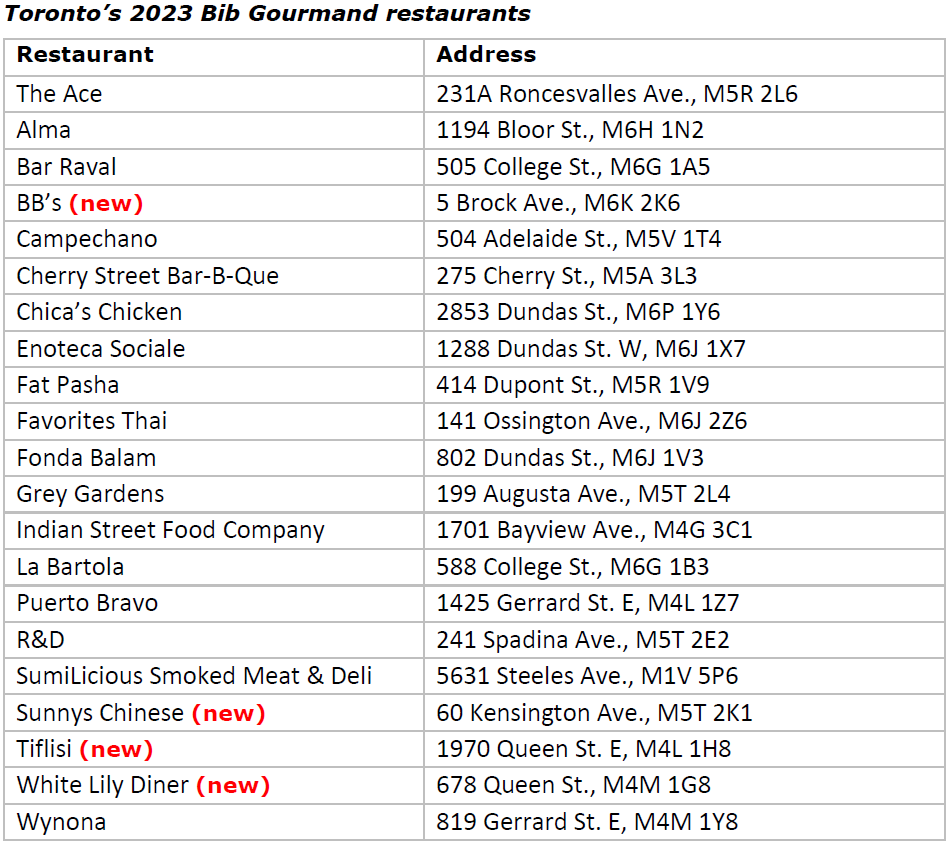
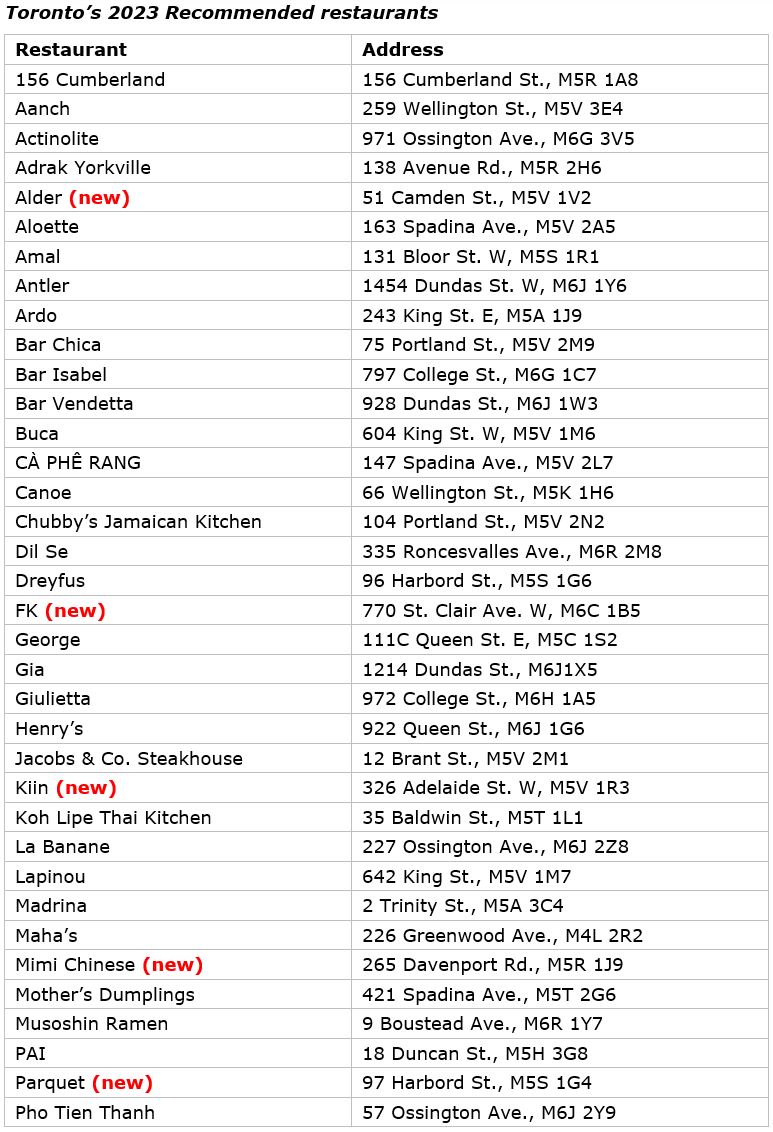
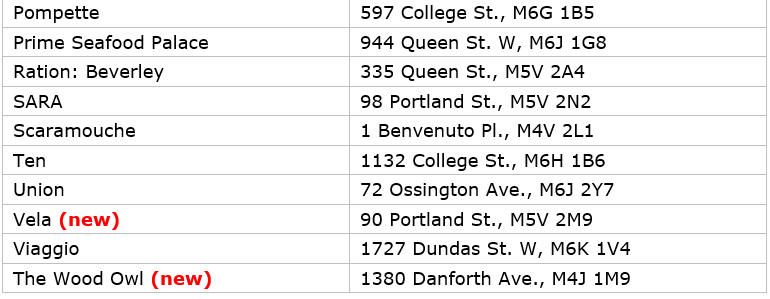
About Michelin North America, Inc.
Michelin, the leading mobility company, is working with tires, around tires and beyond tires to enable Motion for Life. Dedicated to enhancing its clients’ mobility and sustainability, Michelin designs and distributes the most suitable tires, services and solutions for its customers’ needs. Michelin provides digital services, maps and guides to help enrich travel and make them unique experiences. Bringing its expertise to new markets, the company is investing in high-technology materials, 3D printing and hydrogen, to serve a wide variety of industries — from aerospace to biotech. Headquartered in Greenville, South Carolina, Michelin North America has approximately 23,000 employees and operates 34 production facilities in the United States and Canada. (michelinman.com)
About Capital One
At Capital One we’re on a mission for our customers – bringing them best-in-class products, rewards, service, and experiences. Capital One is a diversified bank that offers products and services to individuals, small businesses and commercial clients. We use technology, innovation, and interaction to provide consumers with products and services to meet their needs. Through Capital One Dining and Capital One Entertainment, we provide our rewards cardholders with access to unforgettable experiences in the areas they’re passionate about, including dining, music and sports. Learn more at capitalone.com/dining and capitalone.com/entertainment.
For more information, contact:
Andrew Festa
Michelin North America
andrew.festa@michelin.com
Devon Gunn Capital One
devon.gunn@capitalone.com
Phone: 571-308-4762
Redefining Patient Access: Myndshft Launches First-of-Its Kind Platform Featuring Integrated Medical-Pharmacy Benefits and Prior Authorization for Streamlined Drug Management

MESA, AZ — September 27, 2023 — Myndshft Technologies, Inc., a pioneer in real-time medical benefits and automated prior authorization technology, proudly announces the launch of its revolutionary software platform for managing specialty medications under both medical and pharmacy benefits—the first of its kind in the industry. By simplifying and automating the complex processes involved in specialty medication management, the Myndshft platform bridges the gap between two traditionally isolated components of healthcare benefits, improving speed to therapy for patients.
One Platform. Unlimited Potential.
Healthcare providers, insurers, drug manufacturers, and pharmacies are plagued by the administrative complexities of drug management under disparate benefits. Likewise, patients face care delays, disjointed treatment journeys, higher costs of care, and poorer health outcomes. Recognizing this, Myndshft committed to expanding its suite of services to encompass both medical and pharmacy needs.
“We understand the challenges of siloed prior authorization processes. By developing a consolidated solution for drug management across both benefit types, Myndshft bridges long-standing gaps, enabling seamless data exchange and integrity between providers, PBMs, pharmacies and payers,” notes Ron Wince, founder and CEO of Myndshft.
The Myndshft platform tackles the administrative complexity that 88% of physicians rate as ‘high’ or ‘extremely high’ according to American Medical Association research.1 This optimizes medication management, breaking down barriers to affordability, and most importantly, enhancing the level of care patients receive.
The powerful Myndshft platform supports comprehensive benefits investigations for drugs under medical or pharmacy benefits, real-time benefits checks at the point of care, and intelligent automated prior authorization, offering improved cost transparency and care access to combat treatment abandonment. Moreover, in partnership with Atlas Health, the platform provides automated matching, enrollment, and reimbursement with patient assistance programs to mitigate the economic burdens often associated with specialty medications.
Myndshft Platform Advantages
- Eliminates the need for providers, pharmacists, and patients to navigate multiple systems, significantly decreasing administrative overhead and enhancing care efficiency.
- Improves cost transparency, enabling providers to effectively counsel patients on treatment options.
- Seamlessly integrates into existing healthcare workflows, creating efficiencies that free up human and financial resources.
- Adheres to current and emerging prior authorization regulations including gold carding, as well as state and federal policies and legislation.
“This announcement represents an exciting leap forward, not just for our organization, but for stakeholders across the healthcare spectrum,” says Wince. “By eliminating barriers to fast, equitable access to medications—regardless of whether they fall under medical or pharmacy benefits—Myndshft is creating momentum for value-based care models of the future.”
About Myndshft Technologies, Inc.
Myndshft began with a mission to enable value-based care by empowering healthcare providers and payers to drive down costs and increase revenue while achieving optimal patient care. Today, Myndshft is the only prior authorization platform that handles medications associated with medical and pharmacy benefits, delivering insights directly in any system of record. We do this by combining hands-free automation with Collective Healthcare Intelligence, a single source of truth for patients’ health and benefits information, providers’ clinical documentation, and payers’ plans and policies. Myndshft reduces manual work, eliminates duplication of effort, and shortens preauthorization cycle times so providers and payers can focus on patients, not paperwork.
For more information, visit www.myndshft.com.
1. Source: AMA Prior Authorization Physician Survey
Myndshft Media Contact
Name: Jennifer Royle-Jones
Email: jen@myndshft.com
Phone: (480) 718-2163 ext. 719
Contact Information
Name: Jennifer Royle-Jones
Email: jen@myndshft.com
Job Title: VP of Marketing & Revenue Operations
National Advertising Review Board Refers Smile Prep’s Clear Aligners Advertising to FTC After Compliance Review
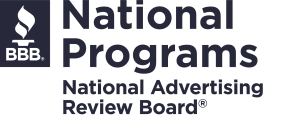
New York, NY – September 27, 2023 – The National Advertising Review Board (NARB), the appellate advertising body of BBB National Programs, has referred advertising claims made by Smile Prep, LLC to the Federal Trade Commission (FTC) for review and possible enforcement action after the company declined to accept NARB recommendations to modify certain claims and disclosures on its website.
The challenged claims appeared on SmilePrep.com, which presents its reviews and rankings of clear aligner companies and their products and services as editorial content. Smile Prep has affiliate relationships with some, but not all, of the companies whose clear aligner products and services Smile Prep reviews and ranks on its website. Commissions from Smile Prep’s affiliate partners are its sole source of revenue.
In its decision (NARB Panel #310), the NARB Panel affirmed NAD’s decision (Case No. 7131) and recommended, among other things, that Smile Prep:
- Clearly and conspicuously disclose that the rankings, reviews, and product information for affiliate partners’ clear aligners on SmilePrep.com are advertising.
- Discontinue certain performance claims about the products and services of Smile Prep’s affiliate partners.
In its advertiser statement, Smile Prep stated that it disagreed with the NARB decision but would nevertheless make a good faith effort to comply with its recommendations. NARB opened a compliance inquiry based on concerns raised by the challenger, SmileDirectClub, LLC. In its Compliance Report, NARB found that Smile Prep had made a number of changes to its website in good faith but nevertheless was still not compliant.
Disclosure Recommendation
As part of its effort to comply with the NARB Panel’s recommendation Smile Prep revised its disclosure of affiliate relationships so that it appeared in a box at the top of each clear aligner review page stating, “Advertising Disclosure” in bold, followed by: “When you buy products and services through our links, we may earn commissions.”
NARB found that this disclosure is neither clear nor conspicuous, and therefore, Smile Prep has not complied with the decision in this respect.
Product Claims
In its decision, the NARB Panel recommended that Smile Prep discontinue the claim that “when it comes to customer service, Byte is the clear winner” and has “better customer support.” Although Smile Prep added qualifiers to these claims, NARB concluded that the addition of the phrases “it is our impression” and “we feel” did not change the nature of the message that the sponsor had engaged in a merits analysis of the clear aligner services being reviewed.
Further, NARB determined that modified language, which attributes performance claims to Byte, including “According to Byte,” and “According to Byte, the Hyper Byte can help provide a more comfortable aligner fit,” did not provide sufficient qualification. NARB also assessed 54 changes made by Smile Prep and found that the majority of the modified claims did not comply with the recommendation to discontinue certain aligner performance claims made by its affiliate partners on the ground that Smile Prep had not independently substantiated them.
For these reasons, NARB concluded that the customer service references and product performance of affiliate partner product claims do not comply with the NARB recommendations.
NARB requested Smile Prep’s agreement to make further modifications consistent with the analysis and comments in this Compliance decision.
In response, Smile Prep advised NARB that it believed that it was already in compliance with the decision and applicable laws and that it could not make all of the additional changes NARB had suggested. Smile Prep further stated that, in the event of a referral, it looked forward to working with the FTC to craft a meaningful and fair approach to the regulation of all affiliate review sites.
As Smile Prep declined to make additional modifications consistent with the analyses in the compliance review, NARB has referred the matter to the FTC for review.
All BBB National Programs case decision summaries can be found in the case decision library. For the full text of NAD, NARB, and CARU decisions, subscribe to the online archive.
About BBB National Programs: BBB National Programs, a non-profit organization, is the home of U.S. independent industry self-regulation, currently operating more than a dozen globally recognized programs that have been helping enhance consumer trust in business for more than 50 years. These programs provide third-party accountability and dispute resolution services that address existing and emerging industry issues, create a fairer playing field for businesses, and a better experience for consumers. BBB National Programs continues to evolve its work and grow its impact by providing business guidance and fostering best practices in arenas such as advertising, child-and-teen-directed marketing, data privacy, dispute resolution, automobile warranty, technology, and emerging areas. To learn more, visit bbbprograms.org.
About the National Advertising Review Board (NARB): The National Advertising Review Board (NARB) is the appellate body for BBB National Programs’ advertising self-regulatory programs. NARB’s panel members include 85 distinguished volunteer professionals from the national advertising industry, agencies, and public members, such as academics and former members of the public sector. NARB serves as a layer of independent industry peer review that helps engender trust and compliance in NAD, CARU, and DSSRC matters.
Contact Information
Name: Jennie Rosenberg
Email: jrosenberg@bbbnp.org
Job Title: Media Relations
Cognition Corporation Raises $6,000,000 to Accelerate Product Development and Customer Expansion in the Life Science Industry
![]()
Cognition’s continued growth enables medical device and pharmaceutical companies to bring safer products to market, while reducing time and costs.
Lexington, MA – September 26, 2023 – Cognition Corporation, the leader in SaaS-based product development and compliance solutions for the life science industry, today announced $6 million in funding, with a $5 million investment by Spring Lake Equity Partners which follows a $1 million investment by members of Cognition’s management team. The funding will be used to accelerate product development as well as increase sales and marketing programs to support Cognition’s rapid growth.
Cognition is shifting the data management landscape for medical device and pharmaceutical product development from a static, document centric approach to a dynamic, information-based data driven approach. Our solutions automate processes with built-in templates and work instructions. We leverage a structured data environment, that enables our customers to easily build relevant connections between data items, automatically create complex trace matrices, and export formatted documents instantly for regulatory submissions – saving both time and money.
“We are excited to secure this funding that will enable us to both accelerate product development and expand our customer base, and in the process help our customers save time and costs while bringing safer products to market faster,” said Gerald Wesel, Chairman and CEO, Cognition Corporation. “Spring Lake Equity Partners shares our vision for a new “structured data” paradigm for life sciences companies and recognizes Cognition’s potential as the leader in this space.”
“Cognition is well positioned to capture a significant portion of the market with their SaaS-based product development solutions. Their solutions leveraging structured data are unmatched in the industry and will change the way life science companies manage and submit their product development data,” said Bob Forlenza, Managing Partner, Spring Lake Equity Partners. “We are excited to partner with Gerald and the entire team at Cognition to achieve the company’s strategic goals.”
For more information about Cognition’s SaaS solutions for life science product development data, visit www.cognition.us.
For more information about Spring Lake Equity Partners visit https://springlep.com
About Cognition
Cognition Corporation specializes in product development and compliance solutions for the life sciences industries. For medical device professionals, Cognition offers a design controls software platform that helps meet regulations faster with real-time traceability, guided design controls, and change once, update everywhere functionality – turning manual and disconnected data into structured submissions that enable them to get to market faster.
Unlike other design controls solutions that simply replicate traditional documents and spreadsheets, Cognition takes a structured data approach combining risk with test and requirements data so you can easily build relevant connections between data items, automatically create complex trace matrices, and export formatted documents instantly – offering a more efficient and integrated solution.
We are shifting the data management landscape for medical device and pharmaceutical product development from a static, document-based approach to a dynamic, information-driven approach helping to streamline and alleviate the administrative burden of product development documentation. Further information about Cognition Corporation can be found at www.cognition.us.
About Spring Lake Equity Partners
Spring Lake Equity Partners is a Boston based firm investing in private technology companies. We seek to partner with great management teams to take their businesses to the next level, creating value for all stakeholders. Spring Lake strives to add value to our portfolio companies through active board participation, strategic planning, and accessing our network of contacts. To learn more please visit www.springlep.com.
Media Contact
Kristen Callahan
Director of Marketing
Cognition Corporation
+1 (781) 253 – 3388
kristen.callahan@cognition.us
National Advertising Division Recommends MacuHealth Discontinue or Modify Certain Claims for Several Brands of Eye Health Dietary Supplements
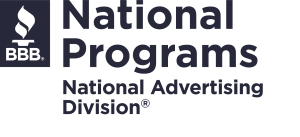
New York, NY – September 21, 2023 – In a challenge brought by Vision Elements, Inc., the National Advertising Division (NAD) of BBB National Programs recommended that MacuHealth, LP modify or discontinue certain claims for its dietary supplement products MacuHealth, MacuHealth Plus+, Vitreous Health, Vision Edge Pro, and TG Omega-3.
Of these supplements, MacuHealth, MacuHealth Plus+, and Vision Edge Pro, each contain a triple carotenoid formula (lutein, meso-zeaxanthin, and zeaxanthin) marketed to help consumers’ vision. VitreousHealth is marketed for managing eye floaters and TG Omega-3 Fish Oil is marketed for various benefits for eyes, heart, and brain health.
MacuHealth Product Claims
NAD determined that the studies submitted by MacuHealth indicating a growing body of research around supplementation with the cartenoids lutein, zeaxanthin, and mesozeaxanthin to effect macular pigmentation and visual performance are a poor fit to substantiate the challenged claims for various reasons, including that the studies were not conducted on MacuHealth as currently marketed to consumers.
Therefore, NAD recommended that MacuHealth discontinue any claims that its MacuHealth dietary supplements:
- Are clinically proven to rebuild or restore macular pigment, and
- Enhance vision or visual performance over a lifetime.
NAD also recommended that MacuHealth discontinue any claims that MacuHealth:
- “reduces inflammation in the retina,”
- “protects against harmful blue light”
- “improves photo-stress recovery and contrast sensitivity.”
- Contains a “patented blend of antioxidants [that] nourishes the eye to protect it against oxidative stress and disease.”
NAD noted that nothing in its decision prevents MacuHealth from making claims regarding the carotenoid formula of 10 mg lutein, 10 mg meso-zeaxanthin, and 2 mg zeaxanthin as long as they are narrowly tailored and properly supported.
MacuHealth Plus+ Claims
NAD found that the record did not contain sufficient evidence to substantiate the claim that MacuHealth Plus+ is “formulated for those diagnosed with Age-Related Macular Degeneration (AMD)” and recommended that the claim be discontinued. Among other things, NAD found that there were significant differences between the formulas marketed to consumers and those tested.
VitreousHealth Claims
To support its VitreousHealth product performance claims, MacuHealth relied on the Floater Intervention Study (FLIES). NAD found that although the FLIES was conducted on the VitreousHealth product and showed some promising results, it was not a good fit for the broad claims that VitreousHealth is “scientifically proven to significantly reduce floaters, enhance visual function and improve a patient’s quality of life” or can “reduce the severity of floaters.” Therefore, NAD recommended that these claims be discontinued, as well as several other challenged claims related to the outcomes of the FLIES.
TG Omega-3 Claims
NAD found that the articles and study provided by MacuHealth as substantiation did not support its TG Omega-3 product performance claims and recommended that the claims that TG Omega-3 “helps with joint pain, arthritis and other diseases” and “promotes eye, brain, heart and overall health” be discontinued.
NAD also noted that the challenged claims, “Both EPA & DHA have been studied and found to be beneficial for dry eye, and supplementation with omega-3 fatty acids is recognized as a key first step in the management of the disease and its symptoms” and “[B]ased on scientific studies, health care providers and optometrists are recommending patients increase their intake of Omega-3s” focus on product ingredients and not on the product as marketed to the consumer.
NAD found that the record did not contain sufficient evidence to support these claims and recommended that they be discontinued.
Improved Bioavailability Claims
NAD evaluated the study submitted by MacuHealth regarding its Micro-Micelle™ technology and determined that it is not competent and reliable scientific evidence to support the advertiser’s broad improved bioavailability claims. Therefore, NAD recommended that such claims be discontinued.
Natural & Gluten Free Claims
NAD recommended that MacuHealth discontinue claims that its MacuHealth product is an “all-natural formulation” and “a natural extract product,” as well as claims that its MacuHealth Plus+ is “clinically tested and gluten-free.”
During the proceeding the advertiser agreed to permanently discontinue many other challenged claims. Therefore, NAD did not review these claims on their merits.
In its advertiser statement, MacuHealth stated that it “believes that the challenged claims are thoroughly supported” and that it “strongly disagrees with the factual conclusions” reached in the decision, but nonetheless will comply with NAD’s recommendations.
All BBB National Programs case decision summaries can be found in the case decision library. For the full text of NAD, NARB, and CARU decisions, subscribe to the online archive. Per NAD Procedures, this release shall not be used for advertising or promotional purposes.
About BBB National Programs: BBB National Programs, a non-profit organization, is the home of U.S. independent industry self-regulation, currently operating more than a dozen globally recognized programs that have been helping enhance consumer trust in business for more than 50 years. These programs provide third-party accountability and dispute resolution services that address existing and emerging industry issues, create a fairer playing field for businesses, and a better experience for consumers. BBB National Programs continues to evolve its work and grow its impact by providing business guidance and fostering best practices in arenas such as advertising, child-and-teen-directed marketing, data privacy, dispute resolution, automobile warranty, technology, and emerging areas. To learn more, visit bbbprograms.org.
About the National Advertising Division: The National Advertising Division (NAD) of BBB National Programs provides independent self-regulation and dispute resolution services, guiding the truthfulness of advertising across the U.S. NAD reviews national advertising in all media and its decisions set consistent standards for advertising truth and accuracy, delivering meaningful protection to consumers and leveling the playing field for business.
Contact:
Jennie Rosenberg
Media Relations
BBB National Programs
press@bbbnp.org
